
The Legend of Zelda: Ocarina of Time is a 1998 action-adventure game developed and published by Nintendo for the Nintendo 64. It was released in Japan and North America in November 1998 and in PAL regions the following month. Ocarina of Time is the first game in The Legend of Zelda series with 3D graphics.
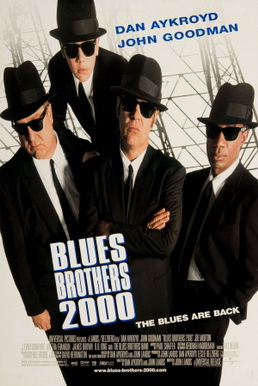
Blues Brothers 2000 is a 1998 American musical action comedy film directed by John Landis from a screenplay written by Landis and Dan Aykroyd, both of whom were also producers, and starring Aykroyd and John Goodman. The film serves as a sequel to the 1980 film The Blues Brothers. It also includes cameo appearances by various musicians.

Tony Hawk's Pro Skater 2 is a 2000 skateboarding video game developed by Neversoft and published by Activision. It is the second installment in the Tony Hawk's series of sports games and was released for the PlayStation in 2000, with subsequent ports to Microsoft Windows, Game Boy Color, and Dreamcast the same year. In 2001, the game was ported to the Mac OS, Game Boy Advance, Nintendo 64, and Xbox. The game was later ported to Windows Mobile and Windows Phone devices in 2006 and to iOS devices in 2010.
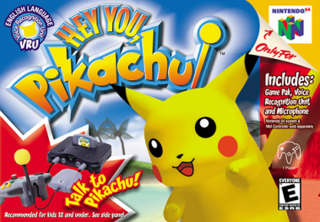
Hey You, Pikachu! is a virtual pet Pokémon spin-off video game for the Nintendo 64 developed by Ambrella and published by Nintendo. It was released in Japan on December 12, 1998, and in North America on October 30, 2000. The player is asked to help Professor Oak test the PokéHelper, a device that lets humans communicate with Pokémon. The game is set in the Kanto region between Pewter City and Viridian City, where the player is introduced to a wild Pikachu. The player is able to communicate with a 256-word database through the Voice Recognition Unit (VRU), a Nintendo 64 hardware accessory that, when paired with a microphone, can comprehend and analyze human speech. Along with speaking with Pikachu, the VRU allows the player to move around and gather items.

Superman: The New Superman Adventures, commonly referred to as Superman 64, is an action-adventure video game developed and published by Titus Interactive for the Nintendo 64 and based on the television series Superman: The Animated Series. Released in North America on May 29, 1999, and in Europe on July 23, it is the first 3D Superman game.

1080° Snowboarding is a snowboarding video game developed and published by Nintendo for the Nintendo 64 in 1998. In the game, the player controls one of five snowboarders from a third-person perspective, using a combination of buttons to jump and perform tricks over eight levels.
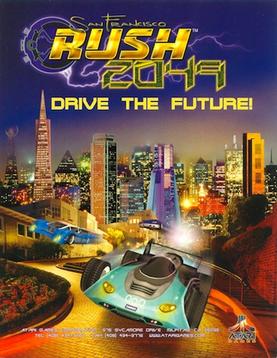
San Francisco Rush 2049 is a racing video game developed and manufactured by Atari Games for arcades. It was ported to the Nintendo 64, Game Boy Color, and Dreamcast by Midway Games West. The arcade machine was released in 1999; home versions followed in 2000 on September 7 for North America and November 17 for Europe. It is the third game in the Rush series and the sequel to San Francisco Rush: Extreme Racing and Rush 2: Extreme Racing USA. It is the last game in the Rush series to be set in the city of San Francisco and the last released on a Nintendo console. It also serves as the final game for the Atari Games label, which was retired shortly after the arcade release. The Dreamcast version was later re-released as part of Midway Arcade Treasures 3 for the PlayStation 2, Xbox, and GameCube and later for Windows as part of Midway Arcade Treasures Deluxe Edition.

Ogre Battle 64: Person of Lordly Caliber is a real-time tactical role-playing game developed by Quest Corporation and localized by Atlus USA for the Nintendo 64. Though conceptually similar to Ogre Battle: The March of the Black Queen, significant gameplay tweaks were implemented to change the game's overall flow. Ogre Battle 64 is the third game in the series, the first two being Ogre Battle: The March of the Black Queen, and Tactics Ogre. Gaidens have been released in Japan, on Game Boy Advance and Neo Geo Pocket Color. Unlike earlier Ogre Battle games, which feature Queen song titles, "Person of Lordly Caliber" is an original title. Ogre Battle 64 was released in PAL regions for the first time via the Wii Virtual Console in 2010.

The Blues Brothers is a platform game based on the band The Blues Brothers, where the object is to evade police and other vigilantes to get to a blues concert. The game was released for IBM PC, Amstrad CPC, Amiga, Commodore 64, and Atari ST in 1991, and for the NES and Game Boy in 1992. It was created by Titus France. A sequel, The Blues Brothers: Jukebox Adventure, was released for the SNES in 1993 and for IBM PC compatibles and the Game Boy in 1994. The theme music of the video game is an electronic arrangement of Peter Gunn. Zzap!64 ranked the Commodore 64 port the eighth-best all-time Commodore 64 game in 1993, and the game was the best platformer for PC, Atari ST and Amiga consoles of 1991 of Zero journalist David Wilson.
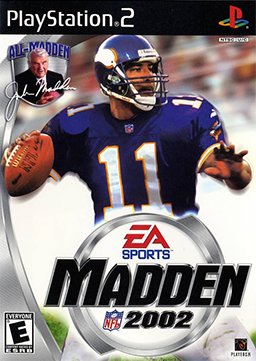
Madden NFL 2002 is an American football video game. It features former Minnesota Vikings quarterback Daunte Culpepper on the cover. Pat Summerall and John Madden are the commentators. The Madden NFL 2002 commercial first aired during Super Bowl XXXVI, three days after Madden NFL 2002 started selling in Japan. Notably, it does not feature the Super Bowl MVP Tom Brady, who is included on later editions of the game as a roster update. It is also the first game to be developed by Budcat Creations.

Titus Interactive SA, known as Titus France SA until March 1999, was a French software publisher that produced and published video games for various platforms. Its head office was located in Parc de l'Esplanade in Lagny sur Marne in Greater Paris. At one time, it was instead located in Montfermeil, also in Greater Paris.
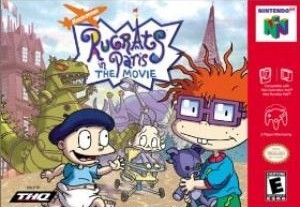
Rugrats in Paris: The Movie is a video game based on the 2000 animated movie of the same name. The game follows the adventures of the Rugrats in a European theme park. A console version of the game was released in 2000, for the PlayStation, Nintendo 64, and a handheld version for Game Boy Color. A version for Microsoft Windows was later released in 2001. The console version's gameplay is similar to Rugrats: Studio Tour, but Paris’ attractions sometimes have minigames too. The handheld gameplay is a side-scrolling platformer. The Windows version's gameplay is an adventure game in which the player must find Chuckie's Wawa Bear.

South Park Rally is a 2000 kart-style racing video game based on the American animated sitcom South Park published by Acclaim Entertainment and released for the PlayStation, Microsoft Windows, Nintendo 64, and Dreamcast. Gameplay follows the player in a competitive racing championship set in the fictional town of South Park. Players are given the options for multiplayer, arcade, or championship modes, but only the championship unlocks extra features. Competition begins in South Park's 1st Rally, a circuit race around four checkpoints in the downtown area of South Park. Races get gradually more diverse, with more locations, racers, and elements added as the game progresses.

Hercules: The Legendary Journeys is a video game developed by Player 1 and published by Titus Interactive for the Nintendo 64 in 2000 and developed and published by Titus Interactive for the Game Boy Color in 2001. The game is licensed from the 1995 television series of the same name, and the Game Boy Color title was released by Titus Interactive alongside Xena: Warrior Princess in the same month, with both games having linked features using the Game Link Cable.
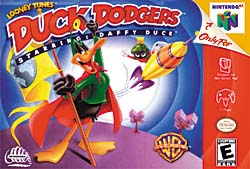
Duck Dodgers Starring Daffy Duck is a platform video game for the Nintendo 64 released in 2000. Based on the 1953 theatrical cartoon, the player takes control of Daffy Duck and explores five fictional planets and saves the Earth. The object is to collect energy atoms to unlock the boss areas and defeat the bosses, whom upon defeating, opens up the next planet. This game has Rumble Pak support and allows the player to save the game directly to the cartridge with the battery back-up, rather than using a Controller Pak, as many other third-party titles on the Nintendo 64 used such to save game data.

Scooby-Doo! Classic Creep Capers is an adventure game published by THQ for the Nintendo 64 and Game Boy Color, based on the Hanna-Barbera cartoon Scooby-Doo, Where Are You!. The Nintendo 64 version, developed by Terraglyph Interactive Studios, was released in November 2000, while the Game Boy Color version was developed by Digital Eclipse Software, and released in February 2001. A PlayStation version, identical to the Nintendo 64 version, had been in development by Terraglyph Interactive Studios but was later cancelled.
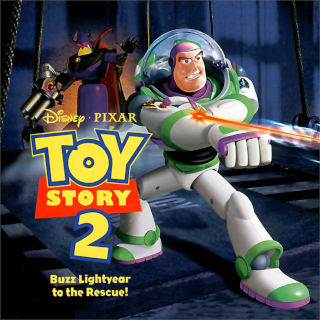
Toy Story 2: Buzz Lightyear to the Rescue! is a platform game developed by Traveller's Tales and published by Activision and Disney Interactive. Based on Disney/Pixar's 1999 computer animated film Toy Story 2, it was released for the Nintendo 64, PlayStation, Microsoft Windows, and Macintosh in late 1999, while a Dreamcast version followed in 2000. The computer versions were released under the title Disney/Pixar's Action Game, Toy Story 2. A different version, a side-scrolling platform game titled Toy Story 2, was also released for the Game Boy Color in 1999.
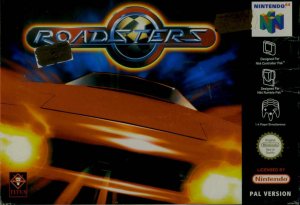
Roadsters is a racing game released by Titus Software for Nintendo 64 in 1999, and for PlayStation, Dreamcast and Game Boy Color in 2000. It is a car racing game that features both licensed cars from manufacturers and unlicensed cars from imaginary manufacturers that are based on and bear great resemblance to their equivalent, real car models. The game also includes a multi-player mode supports up to 2 human players that can compete in any of the available circuits with 4 more CPU controlled racers. A PlayStation 2 version was originally planned to release on April 11, 2001.

Dr. Mario Online Rx, stylized as Dr. Mario Online ℞ and released in PAL regions as Dr. Mario & Germ Buster, is a puzzle video game starring Dr. Mario. It was one of the WiiWare launch games in Japan, Europe, and Australia, and was released in 2008 on March 25 for Japan, on May 20 for Europe and Australia, and for North America on May 26.

Super Smash Bros. is a 1999 crossover fighting game developed by HAL Laboratory and published by Nintendo for the Nintendo 64. It was first released in Japan on January 21, 1999, in North America on April 26, 1999, and in Europe on November 19, 1999. The first installment in the Super Smash Bros. series, it is a crossover between several different Nintendo franchises, including Mario, The Legend of Zelda, Star Fox, Yoshi, Donkey Kong, Metroid, F-Zero, Mother, Kirby, and Pokémon. It presents a cast of characters and locations from these franchises and allows players to use each character's unique skills and the stage's hazards to inflict damage, recover health, and ultimately knock opponents off the stage.


















